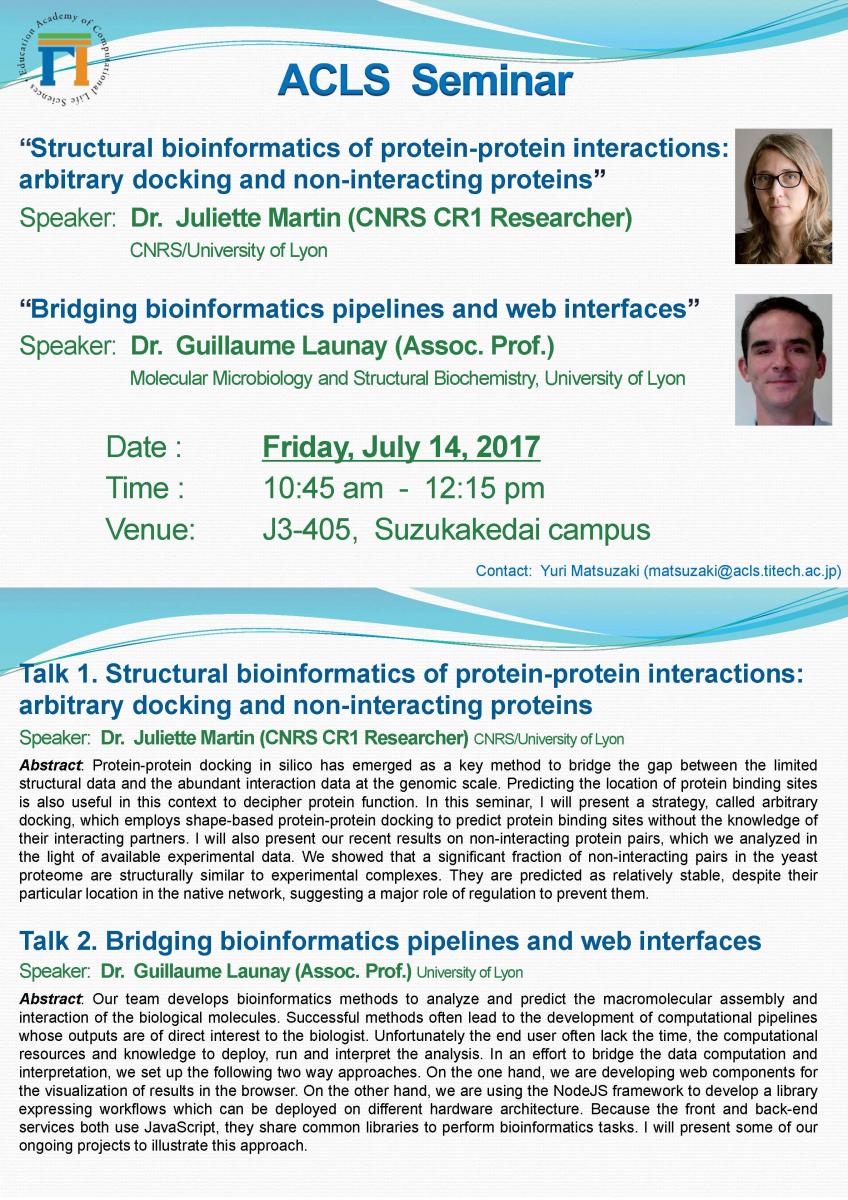7月14日(金)ACLSセミナーを開催します。
“Structural bioinformatics of protein-protein interactions: arbitrary docking and non-interacting proteins”
Speaker : Dr. Juliette Martin (CNRS CR1 Researcher)
Speaker : CNRS/University of Lyon
“Bridging bioinformatics pipelines and web interfaces”
Speaker : Dr. Guillaume Launay (Assoc. Prof.)
peaker : Molecular Microbiology and Structural Biochemistry, University of Lyon
| Date : | Friday, July 14, 2017 |
| Time : | 10:45 am - 12:15 pm |
| Venue: | J3-405, Suzukakedai campus |
Contact: Yuri Matsuzaki (matsuzaki@acls.titech.ac.jp)
Talk 1. Structural bioinformatics of protein-protein interactions: arbitrary docking and non-interacting proteins
Speaker: Dr. Juliette Martin (CNRS CR1 Researcher) CNRS/University of Lyon
Abstract: Protein-protein docking in silico has emerged as a key method to bridge the gap between the limited structural data and the abundant interaction data at the genomic scale. Predicting the location of protein binding sites is also useful in this context to decipher protein function. In this seminar, I will present a strategy, called arbitrary docking, which employs shape-based protein-protein docking to predict protein binding sites without the knowledge of their interacting partners. I will also present our recent results on non-interacting protein pairs, which we analyzed in the light of available experimental data. We showed that a significant fraction of non-interacting pairs in the yeast proteome are structurally similar to experimental complexes. They are predicted as relatively stable, despite their particular location in the native network, suggesting a major role of regulation to prevent them.
Talk 2. Bridging bioinformatics pipelines and web interfaces
Speaker: Dr. Guillaume Launay (Assoc. Prof.) University of Lyon
Abstract: Our team develops bioinformatics methods to analyze and predict the macromolecular assembly and interaction of the biological molecules. Successful methods often lead to the development of computational pipelines whose outputs are of direct interest to the biologist. Unfortunately the end user often lack the time, the computational resources and knowledge to deploy, run and interpret the analysis. In an effort to bridge the data computation and interpretation, we set up the following two way approaches. On the one hand, we are developing web components for the visualization of results in the browser. On the other hand, we are using the NodeJS framework to develop a library expressing workflows which can be deployed on different hardware architecture. Because the front and back-end services both use JavaScript, they share common libraries to perform bioinformatics tasks. I will present some of our ongoing projects to illustrate this approach.











